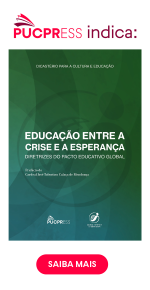Global Compact on Education and the challenges of Artificial Intelligence and Integral Ecology in Education
DOI:
https://doi.org/10.7213/2175-1838.16.002.DS01Abstract
The article addresses the contemporary challenges of education, especially in relation to that is called Artificial Intelligence (AI). The ability to use digital means does not necessarily imply their correct and wise use, which directs the educational challenge towards promoting a culture of digital wisdom that involves both the mind and the heart of individuals in the process. In recent years, the Catholic Church, through the Popes, has shown openness to the digital revolution, recognizing it as a valuable tool for evangelization. However, it also warns about the need for responsible use of social networks and other digital technologies. The article questions the appropriateness of the term "artificial intelligence" and whether it is correct to call this technology "intelligence". Given the indiscriminate use of AI, a major challenge for educators is how to remain fully human and not become machines ourselves. The text concludes by presenting important and innovative pedagogical trends that, in line with the requirements of the Global Pact on Education, the challenges of Integral Ecology, and COP 30, are profoundly influencing the way education is delivered and perceived. These trends lead to the need to rethink and reinvent education in our time.
Downloads
Metrics
Downloads
Published
How to Cite
Issue
Section
License
O(s) autor(es) transfere(m), por meio de cessão, à EDITORA UNIVERSITÁRIA CHAMPAGNAT, pessoa jurídica de direito privado, inscrita no CNPJ/MF sob o n.º 76.659.820/0009-09, estabelecida na Rua Imaculada Conceição, n.º 1155, Prado Velho, CEP 80.215-901, na cidade de Curitiba/PR, os direitos abaixo especificados e se compromete a cumprir o que segue:
- Os autores afirmam que a obra/material é de sua autoria e assumem integral responsabilidade diante de terceiros, quer de natureza moral ou patrimonial, em razão de seu conteúdo, declarando, desde já, que a obra/material a ser entregue é original e não infringe quaisquer direitos de propriedade intelectual de terceiros.
- Os autores concordam em ceder de forma plena, total e definitiva os direitos patrimoniais da obra/material à EDITORA UNIVERSITÁRIA CHAMPAGNAT, a título gratuito e em caráter de exclusividade.
- A CESSIONÁRIA empregará a obra/material da forma como melhor lhe convier, de forma impressa e/ou on line, inclusive no site do periódico da EDITORA UNIVERSITÁRIA CHAMPAGNAT, podendo utilizar, fruir e dispor do mesmo, no todo ou em parte, para:
- Autorizar sua utilização por terceiros, como parte integrante de outras obras.
- Editar, gravar e imprimir, quantas vezes forem necessárias.
- Reproduzir em quantidades que julgar necessária, de forma tangível e intangível.
- Adaptar, modificar, condensar, resumir, reduzir, compilar, ampliar, alterar, mixar com outros conteúdos, incluir imagens, gráficos, objetos digitais, infográficos e hyperlinks, ilustrar, diagramar, fracionar, atualizar e realizar quaisquer outras transformações, sendo necessária a participação ou autorização expressa dos autores.
- Traduzir para qualquer idioma.
- Incluir em fonograma ou produção audiovisual.
- Distribuir.
- Distribuir mediante cabo, fibra ótica, satélite, ondas ou qualquer outro sistema que permite ao usuário realizar a seleção da obra ou produção para recebê-la em tempo e lugar previamente determinados por quem formula a demanda e nos casos em que o acesso às obras ou produções se faça por qualquer sistema que importe em pagamento pelo usuário.
- Incluir e armazenar em banco de dados, físico, digital ou virtual, inclusive nuvem.
- Comunicar direta e/ou indiretamente ao público.
- Incluir em base de dados, arquivar em formato impresso, armazenar em computador, inclusive em sistema de nuvem, microfilmar e as demais formas de arquivamento do gênero;
- Comercializar, divulgar, veicular, publicar etc.
- Quaisquer outras modalidades de utilização existentes ou que venham a ser inventadas.
- Os autores concordam em conceder a cessão dos direitos da primeira publicação (ineditismo) à revista, licenciada sob a CREATIVE COMMONS ATTRIBUTION LICENSE, que permite o compartilhamento do trabalho com reconhecimento da autoria.
- Os autores autorizam a reprodução e a citação de seu trabalho em repositórios institucionais, página pessoal, trabalhos científicos, dentre outros, desde que a fonte seja citada.
- A presente cessão é válida para todo o território nacional e para o exterior.
- Este termo entra em vigor na data de sua assinatura e é firmado pelas partes em caráter irrevogável e irretratável, obrigando definitivamente as partes e seus sucessores a qualquer título.
- O não aceite do artigo, pela EDITORA UNIVERSITÁRIA CHAMPAGNAT, tornará automaticamente sem efeito a presente declaração.



